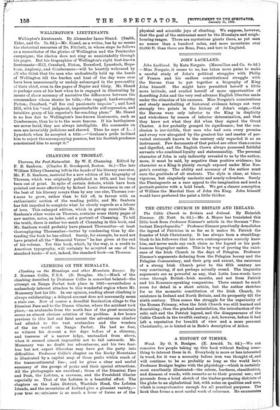WELLINGTON'S LIEUTENANTS.
WeZlington's Lieutenants. By Alexander Innes Shand. (Smith, Elder, and Co. 7s. 6d.)—Mr. Shand, as a writer, has by no means the rhetorical resources of Dr. Fitchett, in whose steps he follows as a resuscitator of the glories of Wellington and the Peninsular campaigns; the clarion does not ring so unmistakably through his pages. But his biographies of Wellington's eight best-known lieutenants—Hill, Craufurd, Pictou, Beresford, Lynedoch, Hope- tcun, Anglesey, and Combermere—will be heartily welcomed by all who think that the men who undoubtedly held up the hands of Wellington till the burden and heat of the day were over have been unnecessarily or unduly submerged in the personality of their chief, even in the pages of Napier and Gleig. Mr. Shand is perhaps seen at his best when he is engaged in illustrating by means of shoor accuracy of narrative the differences between the commanders whose stories he tells,—the rugged, hard-swearing Picton ; Cranfurd, "all fire and passionate impulse "; and Lord Hill, with his "cool judgment, imperturbable self-repression, and intuitive grasp of his superior's far-reaching plans." Mr. Shand is no less fair to Wellington's less-known lieutenants, such as Combermere, than he is to the more famous. If his battlepieces are never lurid, they are always intelligible. His comments on men are invariably judicious and shrewd. Thus he says of Ll Lynedoch when he accepted a title :—" Graham's pride inclined him to reject the accompanying pension, but his Scottish prudence constrained him to accept it."






















































 Previous page
Previous page